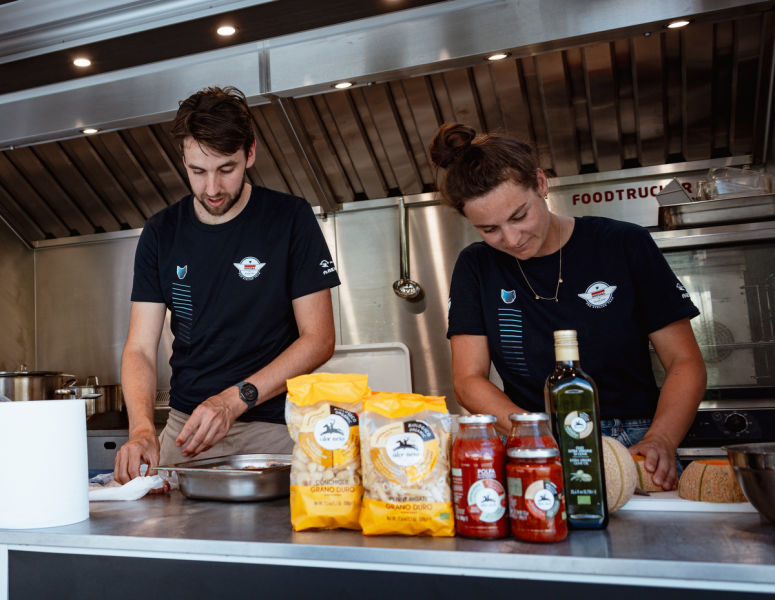At AG Insurance – Soudal and Soudal Quick-Step, we understand that there is no “one-size-fits-all” approach to cycling nutrition.
Each cyclist has unique needs that depend on their body composition, training schedule, and environmental conditions. Our nutritionists support our team by developing tailored nutrition strategies that consider personal preferences and the influence of different weather conditions.
Hydration and electrolyte balance: Personalized strategies for optimal performance. Hydration is essential for cyclists, especially during long rides and races. We emphasize that fluid loss and the concentration of electrolytes in sweat can vary significantly from one cyclist to another. Through specialized sweat testing, the team gains insights into the exact amount of fluid and electrolyte loss per individual and under different conditions. These tests measure sweat rate per hour and sodium concentration, helping to determine the right fluid and electrolyte intake.
.jpg)
In warmer conditions, fluid loss generally increases, and cyclists adjust their hourly fluid intake accordingly. Sodium loss remains relatively stable, but acclimatization to heat can also affect the amount of electrolytes needed. We carefully tailor electrolyte and hydration strategies to environmental factors and the intensity of exertion, ensuring that each cyclist stays optimally hydrated on race days.
Individual adjustments and dietary preferences: In the cycling world, we frequently encounter dietary preferences, food intolerance, and allergies that require specific adjustments. Cyclists with lactose intolerance, gluten allergies, or specific dietary preferences require precisely adjusted nutrition plans. We ensure that each individual receives the right food and nutrients without compromising their performance.
Nutrition in extreme weather conditions: Adapting for heat, cold, and humidity. Extreme weather conditions pose specific challenges for cyclists. In hot conditions, for example, the body increases sweat production to cool down, raising the risk of dehydration. We advise drinking from bottles with cold water both before and during the race to help regulate body temperature. Cold water not only helps keep the internal temperature stable but also provides a cooling sensation.
In cold conditions, sweat-related fluid loss is often less noticeable, but fluid loss through breathing increases, especially in cold and dry weather. In these situations, warm or lukewarm water in bottles is recommended. This helps to keep body temperature stable and prevents unnecessary heat loss.
.jpg)
In high humidity, the body has more difficulty evaporating sweat, which can lead to increased sweat production. Fluid intake is adjusted to the specific weather conditions to ensure our cyclists maintain a constant fluid balance, essential for endurance and performance. Dehydration can lead to decreased performance, fatigue, and heat-related health risks.
A personalized nutrition plan for peak performance: Thanks to carefully tailored, individualized nutrition strategies, our cyclists can perform at their best, regardless of weather conditions and personal dietary preferences. By thoughtfully and attentively addressing the unique needs of each athlete, AG Insurance – Soudal and Soudal Quick-Step ensure that nutrition serves as a foundation not only for energy but also for recovery and protection against the challenges of every race.
Photo: ©Wout Beel
